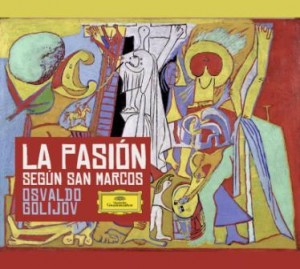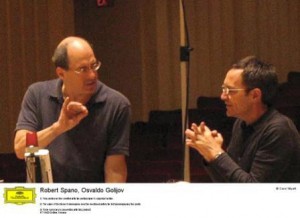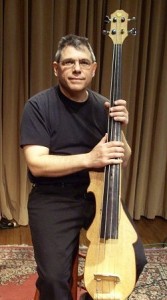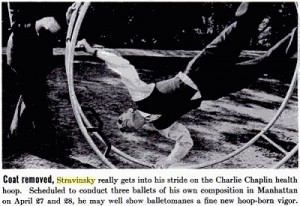 Helmut Lachenmann, 75 years old this year. How does the news strike us? If a composer in Europe, a better than 60%-70% chance that this is an important milestone. If a composer in America, less than 40%-30% chance of the same reaction. As a mainstream American classical concert-goer, the number is probably closer to 10% or less.
Helmut Lachenmann, 75 years old this year. How does the news strike us? If a composer in Europe, a better than 60%-70% chance that this is an important milestone. If a composer in America, less than 40%-30% chance of the same reaction. As a mainstream American classical concert-goer, the number is probably closer to 10% or less.
In the last couple decades, the influence of Lachenmann upon all kinds of composers has been immense, as have been the names of Franco Donatoni, Brian Ferneyhough, Beat Furrer, Gerard Grisey,Tristan Murail, Wolfgang Rihm, Kaija Saariaho… Yet the other thing they all share is how little they appear on the general American concert stage, and so the practically non-existent impact they’ve made on the minds of the average concert-goer.
To which the average concert-goer responds “I don’t know, it’s all just horribly weird sounds to me”; The unsympathetic composer responds “that’s because it sucks”, or “that’s just that elitist Euro-formalist bullshit.”
I tell you, it’s enough to make me think of Teabaggers and Green Party folks! In the end, if someone were to sit down — without their piled baggage of cultural assumptions blocking all ingress — and just listen, they’d find the common thread: all of these people just write music, some combination of sound and idea that totally engages their heart and mind, and can also that of anyone else who opens themselves to it. From a short interview a couple years ago, here is the “Euro-formalist” speaking about what is truly important in his music:
[youtube]http://www.youtube.com/watch?v=vNTqGRykmCo[/youtube]
These aren’t the words of the hermetic formula-maker locked in the laboratory; they’re the words of a man simply in love with music, its history, instruments, people and ideas.
Lachenmann’s birthday is getting some respect in the form of a series of concerts devoted to his work:
Last Thursday SIGNAL, with the JACK Quartet, cellist Lauren Radnofsky and Lachenmann himself as both soloist and speaker, kicked off their celebratory “march” through New York in Buffalo, Friday hit Rochester, and Saturday were on to Troy (review)– all this to culminate Thursday, April 1st in NYC’s Miller Theatre (116th St. & Broadway on the ground floor of Dodge Hall, 8PM, $25/15, 212-854-7799). The event includes an onstage discussion between Lachenmann and Seth Brodsky, as well as five works: Wiegenmusik (1963), Pression (1969-1970), Ein Kinderspiel (1980), String Quartet No. 2 “Reigen seliger Geister” (1989), “…Zwei Gefühle…” (1991-1992).
Coming up on the flank, this Tuesday March 30th the East Coast Contemporary Ensemble will make their own contribution to the festivities, at Good Shepherd Church (152 West 66th Street, NYC, 8PM, $20/10, 212-877-0685), with a number of chamber works featured.
If you’re curious to finally catch up but not in the area, there are a lot of recordings of Lachenmann’s music available; one of the best bets is to get an introduction from the good folk at La Folia. Dan Albertson’s 2004 survey is an especially good starter, and a quick search on their site will provide you with many more perceptive reviews for further listening.




 Spring has definitely sprung down here in Houston; everything that looked dead just a few weeks ago is sprouting all kinds of new growth. And that goes for opera as well, seeing that this year’s iteration of
Spring has definitely sprung down here in Houston; everything that looked dead just a few weeks ago is sprouting all kinds of new growth. And that goes for opera as well, seeing that this year’s iteration of  This year’s festival will also include the world premiere of the winning opera from the 2009 Opera Vista Festival, Anorexia Sacra by Line Tjørnhøj. Line couples the plight of a young woman suffering from anorexia with the writings of the 13th century nun Claire of Assisi. Anorexia Sacra will be performed at 7:30pm on March 20th and 27th at the Live Oak Friends Meetinghouse (1318 West 26th Street).
This year’s festival will also include the world premiere of the winning opera from the 2009 Opera Vista Festival, Anorexia Sacra by Line Tjørnhøj. Line couples the plight of a young woman suffering from anorexia with the writings of the 13th century nun Claire of Assisi. Anorexia Sacra will be performed at 7:30pm on March 20th and 27th at the Live Oak Friends Meetinghouse (1318 West 26th Street). I’ve written before about the one and only
I’ve written before about the one and only 
 In reaction to a roundtable
In reaction to a roundtable